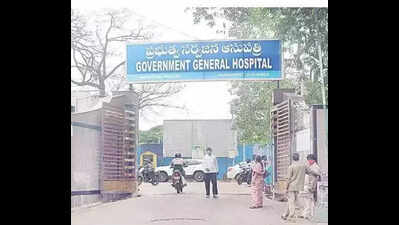Vijayawada: With the aim to provide better medical services to patients, two new Targeted Imaging for Fetal Anomalies (TIFFA) scan machines were inaugurated at the Vijayawada old govt general hospital on Friday. Additional DME Dr D Venkateswara Rao, along with Siddhartha Medical College principal Dr Ashok Kumar, GGH superintendent Dr AV Rao, and others, inaugurated the machines.
It is noted that the scan machines, each costing 32.6 lakh, were provided by the director of medical education (DME), Andhra Pradesh office. Inaugurating the machines, ADME Venkateswara Rao said that the TIFFA scan is performed on pregnant women between 18 and 22 weeks of pregnancy to detect any birth defects, check placenta position and amniotic fluid levels, and monitor fetal movement.
The ADME stated that the TIFFA scan can detect abnormalities in the baby’s face, brain, bones, and skin growth, as well as heart problems, kidney issues, major congenital heart defects, open spinal cord defects, anencephaly, and Down syndrome. He further emphasized that the scan helps ensure fetal health, supports a safe pregnancy, and enables appropriate medical planning and care for pregnant women.
Vijayawada: With the aim to provide better medical services to patients, two new targeted Imaging for Fetal Anomalies (TIFFA) scan machines were inaugurated at the Vijayawada old govt general hospital on Friday. Additional DME Dr D Venkateswara Rao, along with Siddhartha Medical College principal Dr Ashok Kumar, GGH superintendent Dr AV Rao, and others, inaugurated the machines.
It is noted that the scan machines, each costing 32.6 lakh, were provided by the director of medical education (DME), Andhra Pradesh office.
Inaugurating the machines, ADME Venkateswara Rao said that the TIFFA scan is performed on pregnant women between 18 and 22 weeks of pregnancy to detect any birth defects, check placenta position and amniotic fluid levels, and monitor fetal movement.
The ADME stated that the TIFFA scan can detect abnormalities in the baby’s face, brain, bones, and skin growth, as well as heart problems, kidney issues, major congenital heart defects, open spinal cord defects, anencephaly, and Down syndrome. He further emphasized that the scan helps ensure fetal health, supports a safe pregnancy, and enables appropriate medical planning and care for pregnant women.
At the old GGH, TIFFA scans will be performed under the supervision of specialist radiology and fetal medicine doctors or a trained ultrasound technician. A hand-held device called a transducer will be used to emit sound waves, creating real-time images of the fetus on the monitor.
Hospital authorities stated that although TIFFA scan services are available at private super-specialty hospitals, govt has procured and provided these machines to GGH for the first time.








